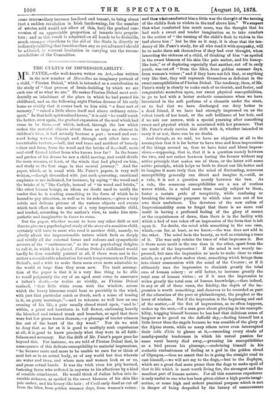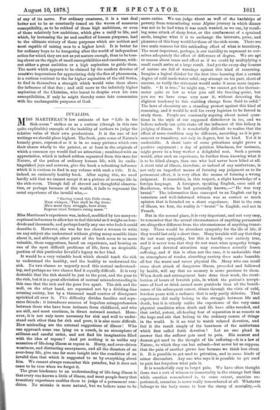THE CULTUS OF IMPRESSIONABILITY.
MR. PATER,—the well-known writer on Art,—has written in the new number of Macmillan an imaginary portrait of a child, "Florian Deleal," which is intended as a contribution to
the study of "that process of brain-building by which we are each one of us what we are." He makes Florian Deleal meet acci- dentally an inhabitant of the place in which he had passed his childhood, and on the following night Florian dreams of his early home so vividly that it comes back to him with "a finer sort of memory," "raised a little above itself and above ordinary retro- spect." In that half -spiritualised house," it is said "he could watch the better, over again, the gradual expansion of the soul which had come to be there,—of which, indeed, through the law which makes the material objects about them so large an element in children's lives, it had actually become a part ; inward and out- ward being woven through and through each other into one inextricable texture,—half, tint and trace and accident of homely colour and form, from the wood and the bricks of it,—half, mere soul-stuff floated hither from who knows how far ? In the house and garden of his dream he saw a child moving, and could divide the main streams, at least, of the winds that had played on him, and study so the first stage in that mental journey." And the paper, which, as is usual with Mr. Pater's papers, is very well written,—though diversified with just such quavering, emotional emphases as are indicated, for instance, by saying "the wood and the bricks of it," like Carlyle, instead of "its wood and bricks," like other human beings, an idiom no doubt used to notify the reader that he is reading something to the form of which he is bound to pay attention, as well as to its substance,—gives a very subtle and delicate picture of the various objects and events which took effect on the nature of a very impressionable child, and tended, according to the author's view, to make him sym- pathetic and imaginative in times to come.
But the paper, whether meant to have any other drift or not than to give us a psychological study of the story of a sensitive child, certainly will have to most who read it another drift, namely, to glorify afresh the impressionable nature which feels so deeply and vividly all the external forms and colours and sympathetic savours of the "environment," as the new psychology delights to call it, in which it is placed. Florian Deleal's childhood would hardly be thus carefully painted at all, if there were not in the author a considerable admiration for such temperaments as Florian Deleal's, and a wish to make them seem even more admirable to the world at large than they seem now. The tacit assump- tion of the paper is that it is a very fine thing to be able to recall poignantly the cry of an aged aunt come to announce a father's death,—to realise so vividly, as Florian Deleal realised, that little white room with the window, across which the heavy blossoms could beat so peevishly in the wind, with just that particular catch or throb, such a sense of teasing in it, on gusty mornings ;"—and to rehearse so well how on one evening of his life, a gate usually closed stood open, "and lo ! within, a great red hawthorn in full flower, embossing heavily the bleached and twisted trunk and branches, so aged that there were but few green leaves thereon,—a plumage of tender crimson fire out of the heart of the dry wood." or do we wish to deny that so far as it is good to multiply such experiences at all, it is good to know precisely what they were in all faith- fulness and accuracy. But the drift of Mr. Pater's paper goes far beyond this. For instance, we are told of Florian Deleal that, in consequence of this delicate susceptibility to material impressions, "he became more and more to be unable to care for or think of soul but as in an actual body, or of any world but that wherein are water and trees, and where men and women look so or so, and press actual hands. It was the trick even his pity learned, fostering those who suffered in anywise to his affections by a kind of sensible attachment. He would think of Julian fallen into in- curable sickness, as spoiled in the sweet blossom of his skin like pale amber, and his honey-like hair ; of Cecil early dead as cut off from the lilies, from golden summer days, from women's voices ;
and thee wkateranforted him a little was the thought of the turning of the child's flesh to violets in the turf above him." Wesuspeet that what comforted him much more, was the thought that he had such a sweet and tender imagination as to take comfort in the notion of "the turning of the child's flesh to violets in the turf above him ;" but be this as it may, it is clear that the ten- dency of Mr. Pater's study, for all who read it with sympathy, will be to make them ask themselves if they had ever thought, when lamenting the sickness of a child, of thinking of him "as spoiled in the sweet blossom of his skin like pale amber, and his honey. like hair," or of deploring especially that another, out of in early youth, was cut off "from the lilies, from golden summer days, from women's voices ;" and if they have not felt that, or anything very like that, they will reproach themselves as deficient in the sweet susceptibilities of Florian Deleal. The tendency, then, of Mr. Pater's study is clearly to make each of us cherish, and foster, and congratulate eurselves upon, our sweet physical susceptibilities, to go to bed with a better msthetic conscience when we have luxuriated in the soft perfume of a clematis under the stars, or to feel that we have discharged our duty better to a dead friend, if we have had strongly impressed on us the velvet touch of her hand, or the soft brilliance of her hair, and if we mix our sorrow, with a special yearning after something sweet and physical which is associated with her presence. That Mr. Pater's study carries this drift with it, whether intended to carry it or not, there can be no doubt.
And though, as we said, we have no objection at all to the assumption that it is far better to have true and keen impressions of the things around us, than to have faint and blunt impres- sions,—supposing, that is, that it is a question merely between the two, and not rather between having the former without any active principle that makes use of them, or the latter with some active principle, which helps us both to direct our life better and to imagine it more truly than the mind of fluctuating, sensuous susceptibility generally can direct and imagine it,—still, as a rule, it is not a question merely between the two. As a rule, the sensuous susceptibilities are a sea of restless waves which, in a mind more than usually subject to them, foster a certain pride of receptivity, while confusing or breaking the stronger purposes to which nine men out of ten owe their usefulness. The devotees of the new cultus of Impressionability seem to forget that there is no more real merit in having a profound feeling of the glory of sunset or the exquisiteness of dawn, than there is in the facility with which a bed of wax takes off an impression of the form that is left upon it. No doubt, the mind adds something in the one case, which,—as far, at least, as we know,—the wax does not add in the other. The mind feels the beauty, as well as retaining a trace of it. The wax only retains the trace of what impresses it. But is there more merit in the one than in the other, apart from the use made of the impression ? If the mind is not merely im- pressed, but uses the impression so made to make clear to other minds, as a poet often makes clear, something which brings them into closer communion with the mind of the Creator ; or if it ultimately uses the impression to diminish greatly the total sum of human misery ; or still better, to increase greatly the total sum of human virtue ; or if it uses the impression to widen greatly the total sum of human knowledge,—then indeed, in any or all of these cases, the fidelity, the depth of the im- pression is worth something, and deserves to be recorded as part of the education of the poet or philanthropist, the prophet or the lover of wisdom. But if the impression is the beginning and end of the matter,—if the flux of impressions, as so often happens, makes up the man,—if a man goes about glorying in his suscepti- bility, hugging himself because be has had that delicious sense of languor as he gazed on the daffodil sky,—feeling himself but a little lower than the angels because he was sensible of the glory of the Alpine storm, while so many others never even interrupted their table d'hôte to glance at it,—recording every shade of namby-pamby tenderness in which his unreal passion for some rural beauty died away,—preening his susceptibilities as a bird preens his plumage,—enshrining himself in his msthetic exclusiveness of feeling as a god in the golden cloud of Olympus,—then we assert that he is going the straight road to cast himself,—we will not say to the dogs,—but to the Zephyrs, which are a great deal more prone than the dogs to make spoil.of that in life which is most worth living for, the strongest and the manliest part of human nature. For all this sensuous experience is only useful to one who has been given, either a high poetic imagi- nation, or some high and ardent practical purpose which ix not in danger of being despoiled by the luxury of sensuousness
of any of its nerve. For ordinary creatures, it is a vast deal better not to be so constantly tossed on the waves of sensuous susceptibility, as to be robbed of those high ambitions, or even. of those relatively low ambitions, which give a unity to life, and which, by increasing the jar and conflict of human purposes, lead to the ultimate victory of those purposes which are noblest and most capable of raising men to a higher level. It is better far for ordinary boys to be hungering after the world of independent action for which they are not as yet mature enough, than to be toss- ing about on the ripple of small susceptibilities and emotions, with- out either a great ambition or a high aspiration to guide them. The merit which appears to be claimed by the modern devotee of sensitive impressions for appreciating duly the flux of phenomena, is a curious contrast to the far higher aspiration of the old Stoics, to find in themselves a strength which would raise them above the influence of that flux ; and still more to the infinitely higher aspiration of the Christian, who learnt to despise even his own susceptibilities, if only he might thereby come into communion with the unchangeable purposes of God.































 Previous page
Previous page